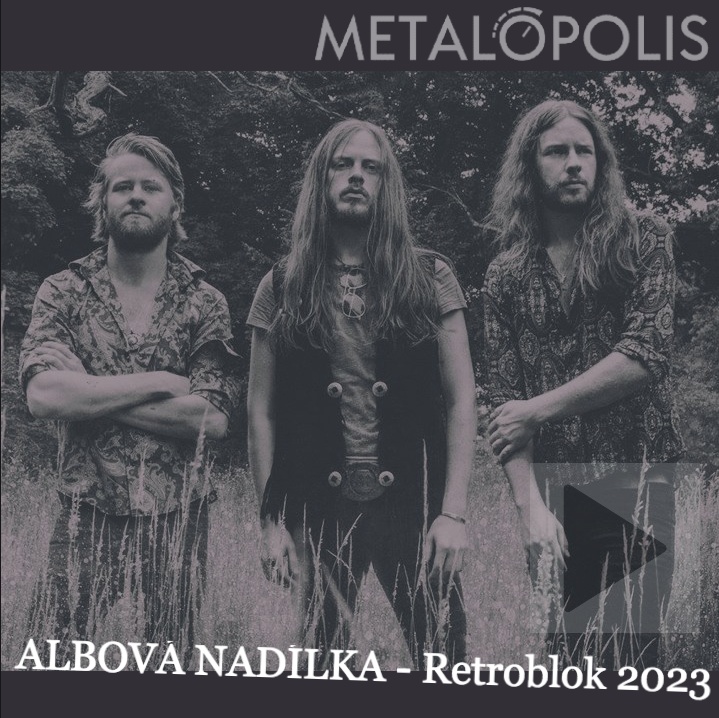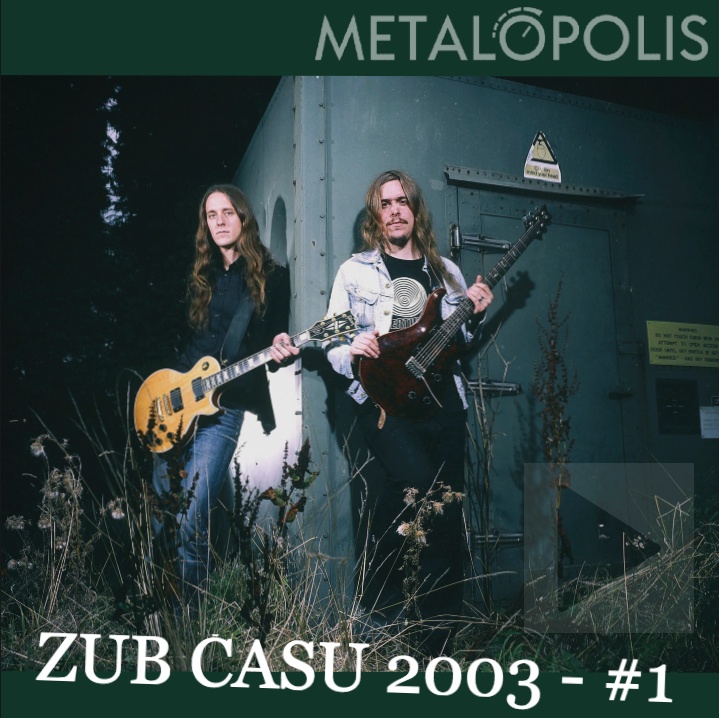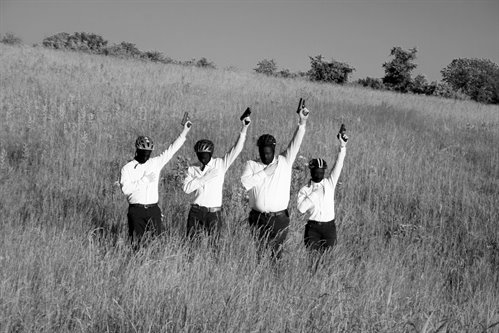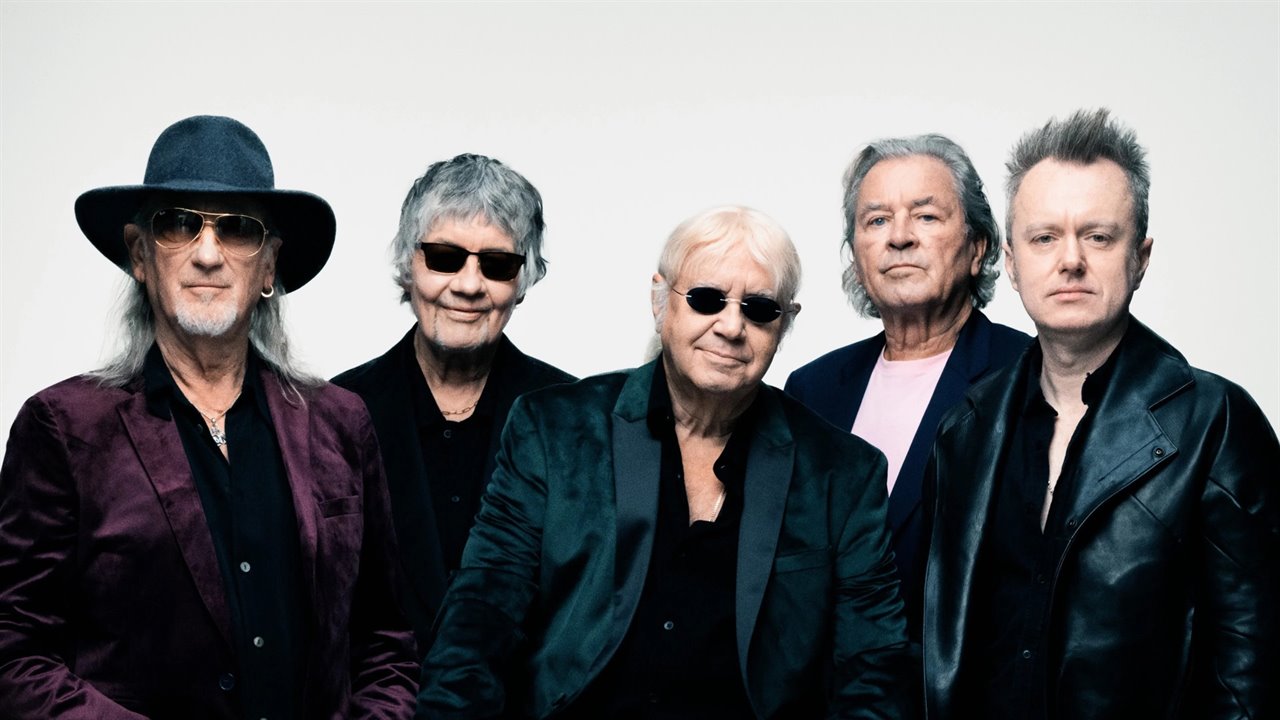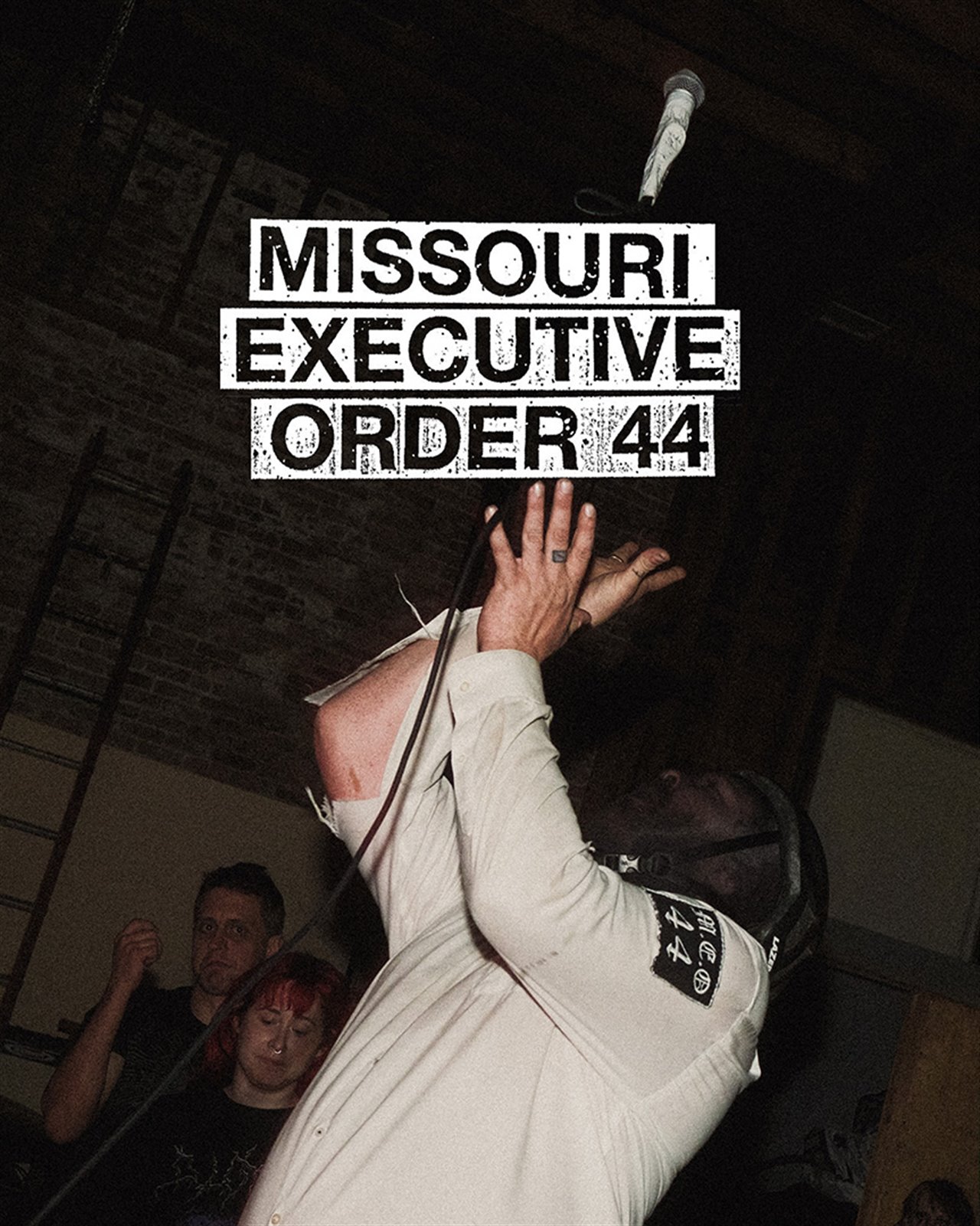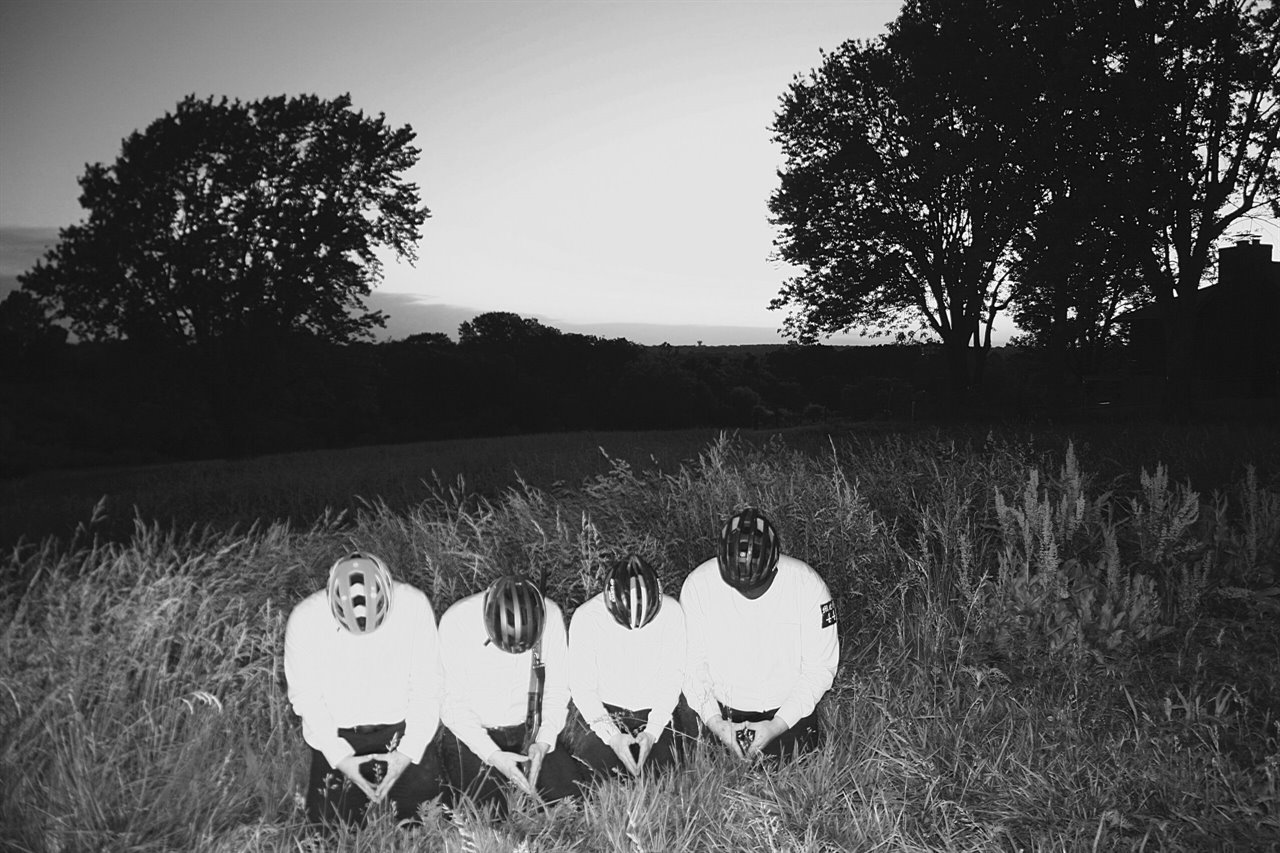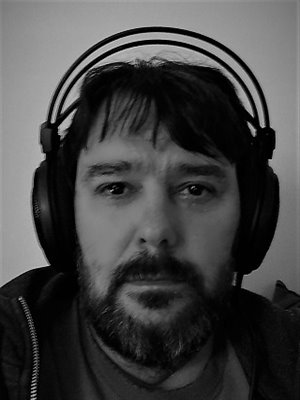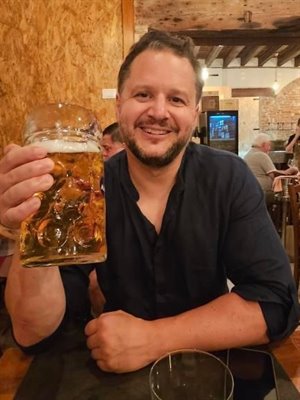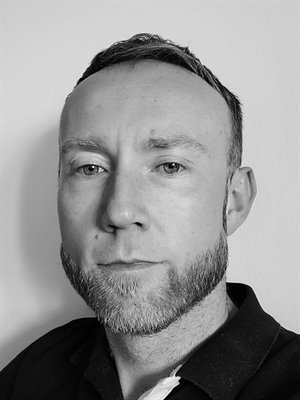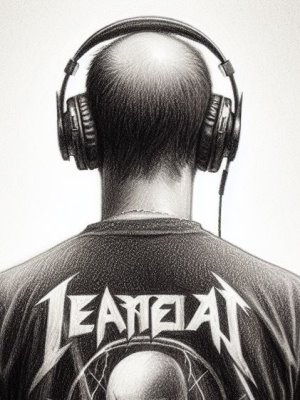A year and a half ago, I toured sixteen clubs in America and saw many local bands. But only one was so exceptional that it wrapped me around its finger, and you could say it has been accompanying me regularly ever since. Not because of the strange name or peculiar image, but mainly because of the music and the energy their concert had.
Let’s start with a question that probably everyone who doesn’t know American history asks. Can you explain what your name means, who came up with it, and why?
Missouri Executive Order 44, also known as the Mormon Execution Order was a state executive order issued on Oct. 27th, 1838 by the then Missouri Governor, Lillburn Boggs. The order was issued in response to a recent clash between Mormons and Missouri State Militia in Ray County, Missouri about an hour northeast from KCMO.
Truthfully this project was started to play maybe one show back in December of 2022 to fill out a grind bill at a venue in Kansas City that we all work at called Farewell. Jarom approached our drummer (Malachi) and guitarist (Elos) about doing this at a movie night at Farewell one slow, cold night. He stated at the corner of the bar that he “wanted to make a sassy, grindy, powerviolence band that dressed up in full Mormon gear - bike helmets and white button ups - called Missouri Executive Order 44”. Jarom had read about the history of the executive order seven years prior and Malachi and Elos agreed to give it the Mormon whirl.
We met up a couple days later for our first practice and wrote all but one of the songs on our first EP. Esau joined the band a week later. From the inception of the band to the release of the first EP was 30 days. We played 40 shows in the first year, and evidently liked each other's company.
The 44 has no relation to anything neo-nazi whatsoever. We are staunchly anti-racist, anti-authoritatrian, and anti-colonial in our message. Nazi punks can fuck off forever.

Jerom had a vision for the band’s outfit to evoke Mormon “uniforms” from the start. Given your name, I understand that. But why the cycling helmets and black stockings?
Here in the states, almost everyone has answered a knock at their door by a member of the Mormon church, proselytizing in their neighborhood. Members don a white button up shirt, black slacks, tie, name badge, and most often make their routes on bicycle. Necessitating a helmet for safety. We opt for black stocking masks as a way to take attention away from who we are as individuals so our message is at the forefront of what we’re doing.
What should be the main message that a person should take away from your concert? It might be a bit of a strange question for you, but in Europe, where you will be playing in 2025, it might be a bit harder to understand. For example, the Czech Republic is one of the most atheistic countries in the world. I know that Mormons exist, I might have seen some, but they have never knocked on my door and I have probably never spoken to any.
If anything Europeans can take from this, is the Anti-Facist & Anti-Colonial message this band brings. We come from the states to share our message how those in power will do anything and everything they can to strip your freedoms away from you. We are about to witness another 4 years of battling against just that very thing. Whether those are your personal freedoms, your religious freedoms, or even your reproductive freedoms. Our message is clear and simple even without the bike helmets and pantyhose. No fascist is welcome here. Stand with your community and fight back.
Are there bands which all of you admire? I’m curious because I hear many different styles and influences in your music. What bands inspire you?
There is a very large array of influences from all of us. Though our sound can be centered around blends of bands such as The Now, Robotosaurus, Saetia, Jenny Piccolo, Neil Perry, Heavy Heavy Low Low, Duck Duck Goose, An Albatross, Breather Resist, Pg. 99, The Jonbenet, and so many more.
We take a lot of influence from Early 2000’s screamo and white belt, as well as later 00’s/early 2010 hardcore and party-thrash bands. We also have other leftfield influences sprinkled in there including a slew of noise rock, jazz, trip hop, industrial, and downtempo influences represented in our approach to samples.

I can really hear the screamo in there, especially in the vocals. However, the guitars and rhythm section are much more intense and rhythmically interesting. They are closer to math metal bands. There’s actually quite a bit of noise rock here too. Your band has actually combined my favorite genres! The end of the year is approaching. What is the best album you’ve heard in 2024?
There have been a handful of standouts from all genres, but here are 5 favorites:
VOTIVE - Towards The Pillory
BLIND GIRLS - An Exit Exists
WEEPING - Spiritual Barbarism
CHAT PILE - Cool World
FLOODING - Silhouette Machine
Are there any bands that you significantly disagree on?
Incubus.
Please do not bring up Incubus. Elos gets very heated if you bring up Incubus in any conversation. If you want to make him really mad, compare the band Everclear to Incubus and you will be in for a long conversation.
Why “Salt Sermon”? i know that it was a speech delivered by Sidney Rigdon on June 17, 1838. But why did you choose it as the LP title?
We felt the title “Salt Sermon” was both a good reference point in relation to the name of the band and the history surrounding it, as well as a reference to the state of the world around us. For example, the line “We are the salt of the Earth, and if the salt has lost its taste, then it’s good for nothing” can be interpreted to describe many current events. Though we like to direct that to those in the members of our community who continue to belittle and oppress others around them.
The original Salt Sermon delivered by Sidney Rigdon was a harsh public condemnation of those disloyal to the original founding members of the church. We interpret our Salt Sermon as a harsh public condemnation of those who continue to belittle and oppress those in marginalized communities around them, and that we must stand together to fight for the rights of ALL citizens in this state.

One of the topics of “Salt Sermion” is ‘Religious trauma.’ Why that one? Do you have any personal experience with it?
ESAU: Religious trauma in the States is an epidemic. By far and large many of us young adults were forced to attend church and follow unquestioningly along. I (Esau) could probably write an essay on childhood trauma and growing up in domineering religious households. Fundamentalist christianity, mormonism, and catholicism incorporate a patriarchal and hierarchical structure to the family unit as a means of control. It also goes without saying that that culture combined with the white-supremacist colonizer mindset makes for a pretty fascistic homelife. All of us still feel the effects of our dysfunctional upbringings as wounds we carry in our hearts as adults.
ELOS: I grew up in a very strict religious household as a child. Many things were restricted and barred from me in my youth, and you viewed the world through a set of blinders that were prepared for you by both your parents and the church. If you stepped out of line, you were severely punished whether that be physically, verbally, or mentally. It is hard to navigate that feeling as a child, I felt ashamed in knowing I wanted to see more in life, and that there was so much more out there to see.
As I grew older I constantly began to seek out those things that were previously restricted to me, and I felt myself shedding my previous skin for a new one that was much more open to the world around me. I knew that this is what I wanted all along, the simple ability to express myself and my creativity freely and openly without fear of religious backlash.
There are a lot of things that attach to you like a weight when you are raised in any form of religious household, and part of growing up is finding ways to remove that baggage over time. The removal of this baggage helps give you a new perceptiveness of openness, appreciation, and respect for others as you grow older.

I can hardly imagine that, and it leads me to a personal question: how did you break away from that world?
As you grow up there will always be certain individual avenues for you to pivot away from the church. Once you get past a certain point of indoctrination at a young age, staying involved in the church becomes much more personal and focused. Something not a lot of teenagers and young adults care about doing once they find other avenues to explore in their lives. A lot of times these are avenues hidden away from the watchful eye of a strict parental household.
Whether those avenues were after school/church programs, unfettered internet access, team sports, exposure to art, or whatever. There are always secular avenues that teenagers and young adults will find that their household has less control over. This is what happened to all of us, and the common theme amongst all of us was our exposure to live music and the culture that surrounds it.
(Esau) - In my dysfunctional family I was able to break away slowly. Once I entered my pubescent years I began to question what I had been taught. I was enrolled in private christian schools until the 7th grade (11/12 years old) and began to attend public school. I finally began to interact with and befriend kids my age that did not share a similar upbringing. Internet access in high school also provided a whole world of mesageboards and music file sharing that I was able to escape into. There weren’t many DIY or punk spaces/shows I could attend in person in my small town so I moved out of state as soon as I was able.
You grew up in religious families and were led to faith – unlike me. Do you believe in God now?
Depends on who in the band you ask. Some of us yes, some us no. Elos. for example. remains a Deist to this day, but does not practice in any organized form or manner.
You sold a special version of the Bible as your merch. Can you tell us more about that?
Before we had much money to make real merch we spent a lot of time making small lines of tapes & CDs that were handdubbed and handstamped. We used to go to thrift stores and buy as many bibles and Books of Mormon we could find to sleeve out CDs alongside with. We knew people would get a kick out of them and they were cheap to make. We have phased out of doing that lately, but it’s a testament to how creative you can be with your merch when funds are low.

In America, I’ve noticed that almost every club has a charity box for trans teenagers, which I haven’t seen anywhere in Europe. I was surprised by how common this is. Can you explain this?
Obviously the climate in the states, mostly amongst right wing over-40’s and 4chan nazi incels, for transgender people is hostile at best. Trans teenagers stand to be in the most vulnerable groups of people who are discriminated against as they have little to no rights as minors. They are at extremely high risk to become homeless and don’t have income unless they find a job with a boss who would illegally employ a minor. Clubs and venues (especially DIY or all ages ones) serve as a part of the larger community social net. They often exist on the fringe of the mainstream consumer “normie” culture and therefore become 3rd spaces considered “safer” for trans artists and art enjoyers. Think of it as a poor box at a church; those don’t really exist anymore but it serves the same purpose, to care for those less fortunate.
You actively identify with the sasscore and white-belt subculture. Can you elaborate on why this is personally important to you?
It’s mostly just a sound we identify with. Our music is sassy, violent, and grindy and that can be hard to limit our band into one particular “genre” but those two subgenres seem to describe our style sonically better than others.
Although the band is originally from Independence, most of you now live and work in Kansas City. I find Kansas City fascinating because it spans both Missouri and Kansas. How does this unique geographical situation impact life in the city?
I must forewarn, this will be a longer answer.
The question many people ask is…
Why is it called Kansas City, Missouri?
The Town of Kansas was originally founded in 1850 on the southern bank of the Missouri River just east of Kansas Territory. Then mostly a landing area for steamboats and settlers heading west. By that time, the towns of Kansas, Westport, and Nearby Independence had become points of significance for the expansion into the western United States. Jackson county alone had three major trails (Santa Fe, California, and Oregon) pass through it, making it a cultural hotbed for settlers looking to make a new life out west.
In 1853 the Town of Kansas was incorporated into a city. Thus becoming the City of Kansas, Missouri. Now, mind you. Just westward lies the Kansas Territory which would cause greater confusion as time went on and the city grew in size and the territory officially becoming a state in 1861. There would be even greater confusion due to the incorporation of Kansas City, Kansas in the 1870s just across the state line. This decision was made to try and attract new business owners to the state, and there were even multiple attempts by the state of Kansas to annex the now well established Kansas CIty, Missouri. Though all of them failed.
Thus, there are two Kansas Cities! One in Missouri (the original), and one in Kansas (the copy). Due to border city mentality, state taxes, and the very interesting border war history between the two states during the American Civil War the Kansas City Metro area has always been a divided one. Close to 8 million people live in the Kansas City Metro today and that is split between two states and two completely opposite tax codes. It is very normal to live in one state and go to work in the other here, and there are specific city taxes designated to those who do so. Life can be very different for you depending on what side of the state line you live on. Some things are more easy and accessible in each state. For example you have the right to an abortion in the state of Kansas, but not Missouri. Though you can legally buy marijuana and gamble on sports in the state of Missouri, but not Kansas. The list goes on and on.
When you live in Kansas City you will frequently be asked “Are you from the Missouri side? Or the Kansas side?” and that can be a defining factor of pride for a lot of people. Though, at the end of the day we all co-exist in some shape or form.

A current topic: Donald Trump won the election for the second time in your country. We in Europe don’t really understand it. Can you explain why this happened and possibly how it will affect your lives?
Unfortunately, Facism is alive and well in America. We see it every day here in the “bible belt”, and have for years. Slowly brewing into the not-so-subtle display of racist and bigoted policies we see today. Many of us saw this coming for the most recent election, as the current Democratic administration did nothing to appeal to the millions of working class folks and considered even moving an inch further left. No policies on healthcare, no policies on childcare, no student loan forgiveness, no policies on military spending in Israel, nothing. We sat back and watched the Democratic Party run a campaign on keeping the status quo and changing next to nothing. You saw exactly how America responded to that in early November.
There is no better time in America than now to learn how to use a firearm to defend yourself, seek community, and organize with those around you. It is only a matter of time before more regulations are cut, more public programs slashed, and more of your basic human rights are threatened by state and federal governments. We fear especially for our female and trans friends whose bodily autonomy will be heavily dictated and put under a microscope for the next 4 years by those who were just voted into power.
These have been scary times here in the states since 2016, and now things will get even scarier. Though, we must carry on.
Thank you for your time, if there is anything what was not mentioned, go ahead. Last words belong to you.
Keep it moving forward and learn to see God in ourselves and each other. Now more than ever we must rely on the communities we surround ourselves in to seek solidarity and push for the change we want to be.





